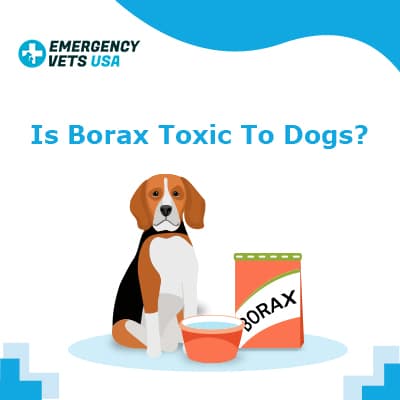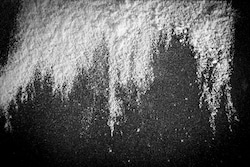Is Borax Toxic To Dogs?
Borax is a common ingredient that is found in many household cleaners and insect repellents.
Though this ingredient can be extremely useful in keeping our home bacteria and pest free, it is not so friendly to our canine friends.
So what is borax and is it toxic to dogs?
In this article we will dive into the details of Borax, and help you understand how to keep your dog safe around this household ingredient.
What Is Borax Used For?

Borax is a naturally occurring mineral that is a product of the element Boron.
Borax, or sodium borate, is pulled directly from the ground and is often found in rocks, soil, plants, and more.
Over the years, Borax has become a staple in cleaners and pesticides due to its bacteria and insect fighting ability.
Some of the most common household items that contain Borax include:
- All purpose cleaners
- Toilet bowl cleaners
- Air fresheners
- Laundry detergent
- Laundry stain removers
- Dish detergents
- Glass cleaners
- Pesticides
- Hand soap
- Fertilizer
What Is The Difference Between Borax and Boric Acid?

When researching Borax, you may stumble across an ingredient called boric acid as well.
Though some online sources say it is exactly the same as Borax, that is not entirely true.
Borax is the natural product of the element Boron, while boric acid is the compound after it has been processed and refined.
Though there are slight differences in the two ingredients, they are both potentially dangerous to our furry friends.
Whether you see Borax or boric acid on a label, you should consider them both a risk.
Is Borax Safe For Dogs?
Borax is a toxic ingredient to our canine companions.
Borax has such a long list of potential toxicity in dogs and humans alike, that many people are trying to avoid the ingredient as often as they can.
Whether Borax is found within a cleaner or is the main ingredient in a pesticide, it is extremely unsafe for your dog.
Borax ingestion in dogs is known to cause vomiting, diarrhea, drooling, abdominal pain, excessive thirst, kidney damage, and even seizures.
Not only can oral ingestion of Borax cause severe symptoms, but the powdered form of Borax can cause severe skin irritation and eye irritation on contact as well.
So if Borax is dangerous to dogs, is boric acid harmful to dogs as well?
Since both forms of the element are so similar, they are equally dangerous to our furry friends.
To keep your pup as safe as possible, it is important to be aware of both Borax and boric acid in any products within your home.
Borax Poisoning Symptoms In Dogs
Though we mentioned the symptoms of Borax ingestion above, it is important to discuss the possible signs of Borax poisoning in our furry friends.
A borax toxicity is a medical emergency that should be addressed immediately, and can cause serious damage if it is left untreated.
Some of the signs of Borax or boric acid poisoning in dogs include:
- Serious gastrointestinal upset such as vomiting, diarrhea, bloody diarrhea, and bloody vomit
- Abdominal pain
- Gastric ulceration
- Drooling or bloody drool
- Neurological symptoms such as twitching, stumbling, seizures, acting strange, etc.
- Severe skin irritation such as swelling, redness, burns, etc.
Signs of borax toxicity in dogs generally appear within 2-4 hours of ingestion.
If your dog is displaying any of the above symptoms, it is best to contact your veterinarian immediately.
What To Do If My Dog Ate Borax
So what do you do if your dog ate Borax or boric acid?
Aside from contacting your veterinarian immediately, there are a few other steps to keep in mind.
First, it is important to find the packaging of the product that your dog consumed.
This is the best way to know just how much Borax was in the product, and can help your veterinarian come up with the best plan of action.
While you are on your way to the vet’s office, it is a great idea to contact the Pet Poison Helpline.
This hotline has a database of every single product on the market and how they can impact our furry friends.
Since veterinarians cannot be aware of every chemical within a product, the poison helpline can offer some extra insight.
This hotline will provide you with a case number during your call, and your veterinarian can speak with their toxicologists directly to find the best treatment option.
What To Expect At The Vet
Once you arrive at your vet’s office, there are a few plans of action that your veterinarian may recommend.
While every situation will vary based on the product that your dog consumed, you can usually expect one of the following treatment plans.
The first possibility is that your veterinarian will induce vomiting upon your dog’s arrival.
This is a great option if your dog recently consumed the toxic substance, or if there are other toxic chemicals in the product that they want your dog to expel immediately.
The next possibility is that your veterinarian will want to hospitalize your dog on IV fluids.
This is the best option if your dog consumed a large amount of Borax, is having symptoms of toxicity, or your dog consumed the substance some time ago.
Your veterinarian will also want to perform diagnostic bloodwork to ensure that their kidneys or other organs have not been affected.
If your dog is displaying neurological symptoms or other serious symptoms of toxicity, your vet may recommend a gastric lavage.
This is when they flush your dog’s stomach under anesthesia in effort to rid the stomach of any remaining toxins.
While this is rare, it may be recommended in some cases.
Prognosis When A Dog Eats Borax
If your dog is treated appropriately for their Borax ingestion, the prognosis is generally good.
By inducing vomiting or hospitalizing them on IV fluids, you can generally offer the support they need to flush the toxin out of their system.
However, if you do not seek treatment when your dog comes in contact with Borax, the outlook is not so favorable.
Since Borax can cause neurological symptoms and kidney damage in severe cases, this can result in long term damage.
In order to offer your pup the best chance at a successful treatment, you should always contact your vet immediately.
Final Thoughts
As you can see, Borax is found in many household items that your dog can easily come in contact with.
Be sure to review the information that we discussed above, and you can protect your dog from the potential dangers of Borax ingestion.

My name is Amber. I am a dedicated animal lover that turned my passion into my career. I am a Licensed Vet Tech with 12 years of experience in veterinary medicine, but I recently took my career online to help spread accurate information on animal care. With how vast the online world is, I have a strong desire to ensure that the reader always walks away with helpful pet advice. With the experience I’ve gained from my time in this field, I have been able to travel the world, offering my services to as many animal rescues as I can find. If I am not at my laptop, or back home visiting family, you can find me somewhere in the world, cuddling every furry friend that I can find! More About Us
